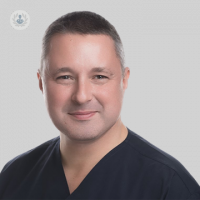Dental implants and how to make them last longer
Written by:Are you about to have a dental implant? Or do you currently have one? Doctor Koray Feran talks to us about dental implants, how long they can last and how to take care of them long-term.

What types of dental implants are there?
There are many different types of dental implants but most implants are screw-shaped and made of titanium. Implants are screw-shaped so that they can be easily inserted into the bone. Once inserted, they remain stable and titanium is biocompatible with the bone, so the bone will grow around the implant, making it more secure. An implant is, in effect, attaching a mechanical joint in a biological environment.
How long can a dental implant last?
Implants don’t necessarily last a patient forever, but sometimes they can. The purpose of implants is to replace permanent teeth, that are to last a person a lifetime, so treatment is carried out with the purpose of creating a long-term solution.
The materials used for the implant need to be high quality and the treatment needs to be of a high standard for the implant to last a long duration. Over time, the dentist learns what materials work better and what connection design works best to keep the implant's long-term. Proper planning, diagnosis and treatment are essential.
Tips for maintaining a dental implant
The best way to maintain an implant is to “marry your hygienist”. In other words, it is vital to visit a dental hygienist at least four times a year, following the treatment. It’s very important for the patient to keep the implant clean, to prevent bacteria from becoming trapped.
It’s also vital to check that the patient's bite is correct and that the implant is not being loaded in a way that may fracture or damage it. Aftercare is an ongoing task. Just like you would treat your car, the implant must be serviced or checked regularly to prevent problems occurring in the future.
Natural teeth wear and move, but implants tend not to move, so if the patient takes good care of their teeth and has them checked on a regular basis, the implant can last for a very long time.
What would you describe as good quality care?
Quality care is the culmination of many decisions based on knowledge and experience, achieved over time. Patients need to be able to trust their specialist, and it’s easier to trust those who have more experience. It’s also important for the patient to understand what the treatment involves and why it’s been done. If patients have any doubt about their treatment and provider, then it is recommended that they seek a second opinion.
How new developments are improving dental treatments
Dental treatments are now becoming digitised and dental care specialists can plan and design treatments on computers in advance. The use of tomography, CT scans and intraoral scanning with digital scanners makes a huge difference because it allows dentists to almost replicate a patient in digital form. This technology provides greater accuracy and less guesswork going into a surgery. It also makes dental prostheses more durable and easier to reproduce.
However, technology is not the most important thing. Good communication and being able to tell the patient what and why a treatment is being done, proper diagnosis and proper care are foremost. This can’t be done with technology.


